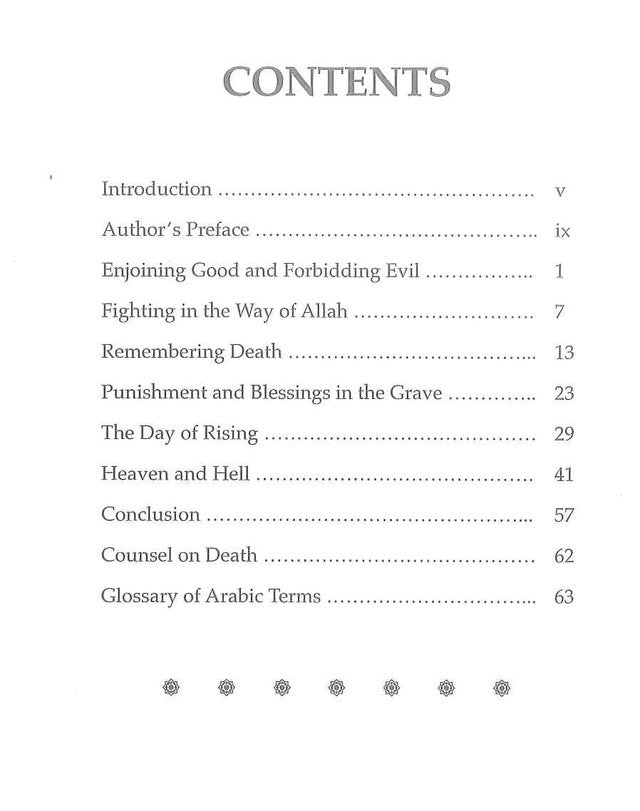Heaven's Door by Imam Ghazali, Imam Jawziya, Iman Hanbali
Heaven's Door by Imam Ghazali, Imam Jawziya, Iman Hanbali
Publisher:
Al Firdous LTD
Author:
Imam Ghazali, Imam Jawziya, Iman Hanbali
Language:
English
Binding:
Paper back
Pages: 85
Size: A5 |5.8 x 8.3 in| 14.8x 21 cm
Couldn't load pickup availability



Collapsible content
Description of Book
Heaven's Door by Imam Ghazali, Imam Jawziya, Iman Hanbali
This enlightening Islamic book explores the profound concept of the doors of Heaven and the pathways to Paradise as presented by three eminent scholars: Imam Abu Hamid Al-Ghazali, Imam Ibn Al-Qayyim Al-Jawziyah, and Imam Ibn Rajab Al-Hanbali. Drawing from the Quran and Sunnah, the book delves into the attributes of the gates of Jannah, their significance, and the deeds that grant entry through them.Imam Al-Ghazali offers insights into the spiritual purification and sincerity required to approach these gates. Imam Ibn Al-Qayyim elaborates on the roles of faith, good deeds, and the mercy of Allah in attaining eternal bliss. Imam Ibn Rajab provides practical guidance on repentance, worship, and living a righteous life to secure entry into Paradise.
Publisher
Al Firdous LTD
Author
- Imam Ghazali, Imam Jawziya, Iman Hanbali
Sample Pages - Content
Heaven's DoorPart Two ofThe Purification of the Soulcompiled from the works of Ibn Rajab al-Hanbali, Ibn al-Qayyim al-Jawziyya & Abu Hamid al-GhazaliCONTENTSIntroductionAuthor's PrefaceEnjoining Good and Forbidding EvilFighting in the Way of AllahRemembering DeathVix1713Punishment and Blessings in the Grave..... 23The Day of Rising29Heaven and HellConclusion.....4157Counsel on DeathGlossary of Arabic Terms6263Enjoining Good and Forbidding Evil3This hadith shows that rejecting evil should be done according to your strength and ability, but should be done at least with your heart, because if your heart does not deny evil, this means that your iman is gone. Therefore you must change evil with your hand and tongue if you are able to do so, but in any event you must reject it with your heart and this is an obligation and the least of faith - otherwise Allah's punishment will come.Hudhaifah related that the Prophet said, "By Him in Whose hand my soul is, you must enjoin what is good and forbid what is evil, or Allah will certainly soon send punishment from Him to you. Then you will make supplication and not receive any answer." 2An-Nu'man Ibn Bashir related that the Prophet said, "The metaphor of a person who complies with Allah's orders and pro- hibitions in comparison to those who violate them is like the meta- phor of some people who drew lots for their seats in a boat. Some of them were given seats on the upper deck, and the others on the lower deck. When those on the lower deck needed water, they would have had to go up to fetch the water, so they said, 'Let us make a hole in our part of the ship and save those who are above us from our troubling them.' If the people on the upper deck let the others do what they suggested, all the people in the boat would be de- stroyed, but if they prevented them, both groups would be safe."3Abdullah Ibn Mas'oud related that the Prophet said, "There was never a Prophet sent before me by Allah to his nation who did not have among his people disciples and companions who followed his ways and obeyed his command. Then after them came their successors who said what they did not do, and did what they were not commanded to do. Whoever strove against them with his hand was a believer; whoever strove against them with his tongue was a believer; and whoever strove against them with his heart was a believer; and beyond that there was no faith, not even as much as a mustard seed."4Abu Bakr related that the Prophet said, "If acts of disobe- dience occur among any people and they do not change them even though they are able to do so, Allah will soon punish them all."5Guidelines on Enjoining Good and Forbidding EvilKnowledgeIn order to enjoin good and forbid evil, you must know the princi- ples governing them and how to distinguish between them. Actionsa
Imam Ghazali, Imam Jawziya, Iman Hanbali
Imam Al-Ghazali was a renowned Persian theologian, philosopher, and mystic, often regarded as one of the most important figures in Islamic thought.
Imam Ibn al-Jawzi was a prolific scholar, theologian, and historian from the Hanbali school of thought. He is widely known for his works in the fields of hadith, tafsir (Quranic exegesis), and Islamic ethics.
Imam Ahmad ibn Hanbal was the founder of the Hanbali school of Islamic jurisprudence, one of the four major Sunni schools of law.



